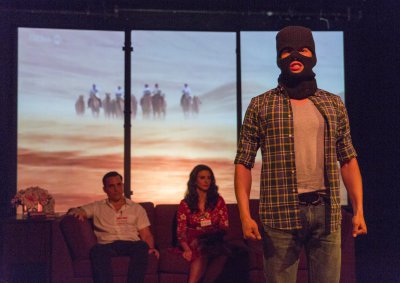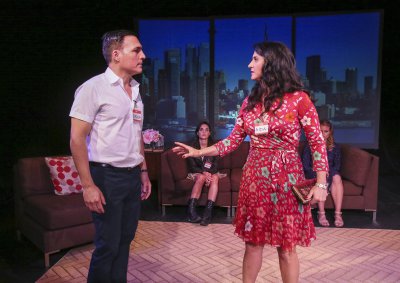Araberlin
Jalila Baccar’s drama explores terrorism from an angle which is typically not considered: that of the aftereffects on family and friends in learning that one of kin has defected from society for a militant cause.

Rafael DeMussa, Lisa LaMattina and Gabriel Diaz DeSalas in a scene from “Araberlin” (Photo credit: Richard Termine)
[avatar user=”Ryan Mikita” size=”96″ align=”left” ] Ryan Mikita, Critic[/avatar] The topic of terrorism has become a stigma within the entire Western World. Existing prior to, but more relevant than ever in the advent of 9/11, the rise of a new terrorist organization has become as commonplace in the daily news as seemingly any other headline. Though the subject is analyzed and debated almost to redundancy, Jalila Baccar’s Araberlin explores terrorism from an angle which is typically not considered: that of the aftereffects on family and friends in learning that one of kin has defected from society for a militant cause.
Written almost ten years ago, Araberlin is the story of the mysterious disappearance of Mokhtar (Gabriel Diaz DeSalas), a young man whom it would appear has left America to join an ISIS-like militant group. A bleak story with much in common with the present, the play glides between the past and present, flashing to scenes between Mokhtar with his family, or scenes solely featuring his loved ones following his disappearance. Focusing on the dysfunctional elements in Mokhtar’s life prior to the events of the play, Diaz DeSalas as Mokhtar is an angst-filled young man who hardly had a normal relationship in his life.
The current artistic director of Horizon Theatre Rep, Rafael De Mussa, is cast in the prominent role of Mokhtar’s father (among other roles), and while De Mussa is clearly engaged, the performance suffers in its lack of consistency. Another prominent figure in Mokhtar’s life is his girlfriend Katarina, played by Elena Rusconi, who provides a strong and honest performance which retains any sense of intimacy the play may have had. The relationship between Rusconi and Diaz DeSalas is tangible and essential to the production’s success: if it weren’t for this grounded duo, the play would have little heart otherwise.

Rafael De Mussa, Elena Rusconi, Lisa LaMattina and Malin Burr in a scene from “Araberlin” (Photo credit: Richard Termine)
Nearly all of the actors in the production are double or triple cast, and little is done to distinguish any of these characters from the next—save for a small costume addition here or there which frankly does little to make a difference. As a result this production lacks clarity, and for a play which is made up of many brief scenes—all of which could have been separately impactful—the play as a whole inevitably feels like one big wash of emotion.
In between the many fragmented scenes, old news clips are projected onto a large screen situated behind the set. Though the amount of news footage shown by the end of the play as a whole felt slightly unnecessary, this use of media was effective in tying in the decade-old story to the current times. At the performance under review, it did appear that there were some technical miscues, which slowed the pace down tremendously, and seemed to have made it difficult for the actors to maintain their rhythm. As a result the evening felt uneven, and while the content is certainly meaningful and with purpose, this was a production which largely felt undecided in its opinion.
On top of performing in the production in a prominent role, De Mussa also directed and designed the set for the production. In what seems like a clear lack of collaborative input, Araberlin is a startling play which is as resounding now as it was at its inception, but in this incarnation struggles to get on its feet and has little emotional impact by the final curtain.
Araberlin (through July 19, 2015)
Horizon Theatre Rep
The 4th Street Theatre, 83 East 4th Street, in Manhattan
For tickets, call 212- 868-4444 or visit http://www.smarttix.com
Running time: Two hours including one intermission






Leave a comment